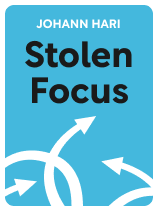

This article is an excerpt from the Shortform book guide to "Stolen Focus" by Johann Hari. Shortform has the world's best summaries and analyses of books you should be reading.
Like this article? Sign up for a free trial here .
Do you have trouble concentrating? Why can’t people focus anymore?
Stolen Focus by Johann Hari argues that our attention crisis is the result of outside forces stealing our focus. Hari says that there’s obvious proof many people can’t focus: people aren’t reading as much and our minds wander too much.
Read below the signs that many people are having trouble concentrating.
It’s Harder to Read
Hari argues that reading—the most common flow experience—is also disappearing from people’s lives. We engage less with the complex cognitive task of reading and, as a result, we are changing how we engage with complex topics.
The Impact of Reading on Screens
Hari explains that as we read more from screens, we ultimately become worse readers and have trouble concentrating. He says more than half of the US population doesn’t read any books over a year. In Britain, so few people buy books that the market for printed novels shrank by 40% between 2008 and 2016.
In addition to pulling us away from books, reading on a screen affects how we interact with books and information when we do read, in three ways:
- The skimming and scanning we do on screens become our go-to reading strategy. This makes books less enjoyable because they’re not set up for skimming and scanning.
- We absorb and retain less information when we read on a screen, as opposed to on paper.
- Over time, we become less able to process long texts and complex information.
Hari argues that struggling to read and the attention crisis are mutually reinforcing. The more difficult it is to pay attention, the less we read books; the less we read books, the less we exercise the cognitive skills that help us pay attention.
How Reading Changed in the 19th Century
The idea that our relationship with books has changed isn’t new. In Amusing Ourselves to Death, Neil Postman argues that two inventions changed the nature of reading in the 19th century, the first being the telegraph. The telegraph made it possible to communicate short bursts of information across great distances. Over time, the country evolved from a slow, print-centered culture to one that valued speed and quantity of information over relevance.
The development of modern photography also contributed to this new hunger for information to be delivered in quick, easy-to-digest formats. Instead of slogging through a long book about life in another culture, you could glance at a photograph and immediately get a sense of another world, without all the mental effort of reading.
It’s Harder to Think
One proof of the attention crisis is that we’re struggling to think. Our idea of concentration is being laser-focused on a specific task. However, our minds also need to wander purposefully to make connections and insights, which the constant distractions of modern life impede.
Mind Wandering
The brain performs three functions when your mind wanders:
- It has insights. While you allow your mind to wander, the brain unravels complex ideas, helping you understand them.
- It makes new connections. While your mind wanders, it makes new associations between ideas, which helps you find solutions to problems.
It prepares you for the future. While the mind isn’t occupied with immediate concerns, it can consider future scenarios and prepare you for them.
Intentional vs. Unintentional Mind-Wandering
In Hyperfocus, Chris Bailey differentiates between unintentional and intentional mind-wandering, or “scatterfocus.” Unintentional mind-wandering distracts you from your original intention. But in scatterfocus, you deliberately leave room in your working memory to allow your mind to wander. According to Bailey, when you mind-wander intentionally, you can maximize its short-term and long-term benefits because you remember your insights and connections; if your mind wanders unintentionally, you’re far less likely to remember anything useful.
Bailey suggests two main ways to intentionally mind-wander. First, try a fun task that takes up little working memory, leaving the rest of your working memory free to let your mind wander. Regularly check in to see what you’re thinking about, and jot down any great ideas. Secondly, schedule time to record your ideas. Bailey recommends scheduling weekly blocks with just your thoughts and a notepad. During this time, don’t think about anything in particular. Instead, write down whatever useful thoughts pop into your head.

———End of Preview———
Like what you just read? Read the rest of the world's best book summary and analysis of Johann Hari's "Stolen Focus" at Shortform .
Here's what you'll find in our full Stolen Focus summary :
- The seven factors causing the current attention crisis
- Johann Hari's three-part solution to gaining your attention back
- Why society needs to change, not just individuals






